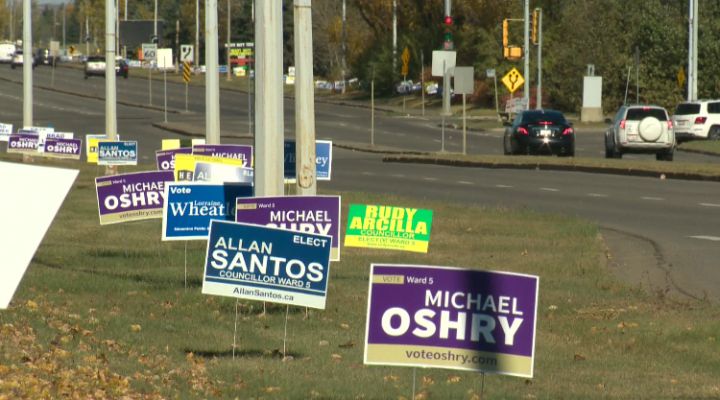EDMONTON – On Monday, voters in Edmonton head to the polls to elect a new mayor and city council. And for the first time in over 60 years, there is a chance that council will not include any women.

If that happens, it will be the first time since 1951 that Edmonton had an all-male council.
Jim Taylor, executive director of the Downtown Business Association and former Edmonton city councillor, said there is a real risk no women will be elected to Edmonton’s city council on Monday.
Taylor told Global News that even if only one or two women were elected it would be very unusual.
“Usually there’s been three, four, five or six, and in 1989, the mayor was a female and we had six councillors, so the majority of council was female,” said Taylor.
Currently, Karen Leibovici is in a three-way race with Don Iveson and Kerry Diotte for the office of the mayor. But recent polls incidate that Leibovici and Diotte are trailing Iveson. Kristine Acielo, Joshua Semotiuk and Gordon Ward are also running for mayor.
READ MORE: Mayoral candidates highlight final key issues before election day
Taylor said that if Leibovici doesn’t win the mayoral race, the best chances for women candidates to be elected to council come in the wards where there are no incumbents running.
Generally speaking in Edmonton elections, fortune favours the incumbent.
Six of Edmonton’s 12 wards have incumbents running in the 2013 civic election. All of the incumbents are male, and Taylor said he doesn’t believe any of them are in real trouble of not being re-elected.
Taylor said that unless a candidate has done something to alienate voters, incumbents are usually a safe bet to be re-elected.
“I always think that incumbents beat themselves. They do something that doesn’t resonate with the voters, and somebody else is there who’s a good candidate and they win. I look at the six incumbents right now, and I don’t see any obvious defeats, upsets there.”
The possibility of an all-male council in a vibrant democracy such as Edmonton is simply unacceptable, said Anne McLellan, a former cabinet minister and Edmonton MP.
“It’s pretty remarkable in a major urban centre in 2013 to see an all-male council,” McLellan told Global News. “It’s certainly not representative of the population.”
She said that Edmonton’s situation could be explained by “an unfortunate convergence of circumstances,” with three senior female councillors retiring, and a fourth – Leibovici – running for mayor.
However, she said that in federal, provincial and municipal politics across Canada, we have a long way to go, as it is still a struggle to get the number of women in elected positions in Canada above the 25 per cent mark.
McLellan is calling for a national movement to encourage more women to run for elected positions in their communities.
Friday marked “Persons Day” and the 84th anniversary the “Persons Case” decision – a landmark constitutional case that decided women were eligible to sit in the Canadian Senate and, in doing so, had the same rights as men in regards to political positions.
The anniversary comes at a time where women are making significant gains in some political arenas. Half of Canada’s provinces are led by female premiers, and one of three territories.
In the 2011 federal election, 76 of 308 seats in the House of Commons went to women, beating the previous record of 69 women elected in the 2008 federal election.
But despite the record numbers, many argue that we are a long way away from gender equality in federal, provincial and municipal politics.
Last month, St. John’s, Newfoundland, elected an all-male council. Sheilagh O’Leary, who lost the mayoral race to Dennis O’Keefe, said that having a council with no females when women make up 52 per cent of the population is “just wrong.”
Male-in ballot for St. John’s council, as women shut out http://t.co/kg6NOZK0j3
— Sheilagh O’Leary (@Sheilagholeary) September 25, 2013
Equal Voice, a national, multi-partisan organization “dedicated to electing more women to all levels of political office in Canada,” said that despite recent gains, Canada still lags behind most countries in Europe, as well as parts of Africa and Australia, in terms of the number of women elected.
The United Nations has said that increasing the participation of women in governments of all levels is a widely held goal, adding that the empowerment and improvement of women’s status in the political arena “is essential for the achievement of both transparent and accountable government.”
*With files from Emily Mertz



Comments